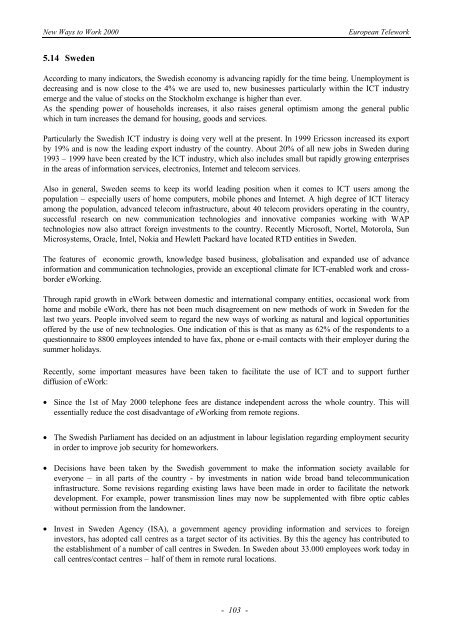eWORK 2000 - European Telework Week
eWORK 2000 - European Telework Week
eWORK 2000 - European Telework Week
- No tags were found...
You also want an ePaper? Increase the reach of your titles
YUMPU automatically turns print PDFs into web optimized ePapers that Google loves.
New Ways to Work <strong>2000</strong><strong>European</strong> <strong>Telework</strong>5.14 SwedenAccording to many indicators, the Swedish economy is advancing rapidly for the time being. Unemployment isdecreasing and is now close to the 4% we are used to, new businesses particularly within the ICT industryemerge and the value of stocks on the Stockholm exchange is higher than ever.As the spending power of households increases, it also raises general optimism among the general publicwhich in turn increases the demand for housing, goods and services.Particularly the Swedish ICT industry is doing very well at the present. In 1999 Ericsson increased its exportby 19% and is now the leading export industry of the country. About 20% of all new jobs in Sweden during1993 – 1999 have been created by the ICT industry, which also includes small but rapidly growing enterprisesin the areas of information services, electronics, Internet and telecom services.Also in general, Sweden seems to keep its world leading position when it comes to ICT users among thepopulation – especially users of home computers, mobile phones and Internet. A high degree of ICT literacyamong the population, advanced telecom infrastructure, about 40 telecom providers operating in the country,successful research on new communication technologies and innovative companies working with WAPtechnologies now also attract foreign investments to the country. Recently Microsoft, Nortel, Motorola, SunMicrosystems, Oracle, Intel, Nokia and Hewlett Packard have located RTD entities in Sweden.The features of economic growth, knowledge based business, globalisation and expanded use of advanceinformation and communication technologies, provide an exceptional climate for ICT-enabled work and crossbordereWorking.Through rapid growth in eWork between domestic and international company entities, occasional work fromhome and mobile eWork, there has not been much disagreement on new methods of work in Sweden for thelast two years. People involved seem to regard the new ways of working as natural and logical opportunitiesoffered by the use of new technologies. One indication of this is that as many as 62% of the respondents to aquestionnaire to 8800 employees intended to have fax, phone or e-mail contacts with their employer during thesummer holidays.Recently, some important measures have been taken to facilitate the use of ICT and to support furtherdiffusion of eWork:• Since the 1st of May <strong>2000</strong> telephone fees are distance independent across the whole country. This willessentially reduce the cost disadvantage of eWorking from remote regions.• The Swedish Parliament has decided on an adjustment in labour legislation regarding employment securityin order to improve job security for homeworkers.• Decisions have been taken by the Swedish government to make the information society available foreveryone – in all parts of the country - by investments in nation wide broad band telecommunicationinfrastructure. Some revisions regarding existing laws have been made in order to facilitate the networkdevelopment. For example, power transmission lines may now be supplemented with fibre optic cableswithout permission from the landowner.• Invest in Sweden Agency (ISA), a government agency providing information and services to foreigninvestors, has adopted call centres as a target sector of its activities. By this the agency has contributed tothe establishment of a number of call centres in Sweden. In Sweden about 33.000 employees work today incall centres/contact centres – half of them in remote rural locations.- 103 -








